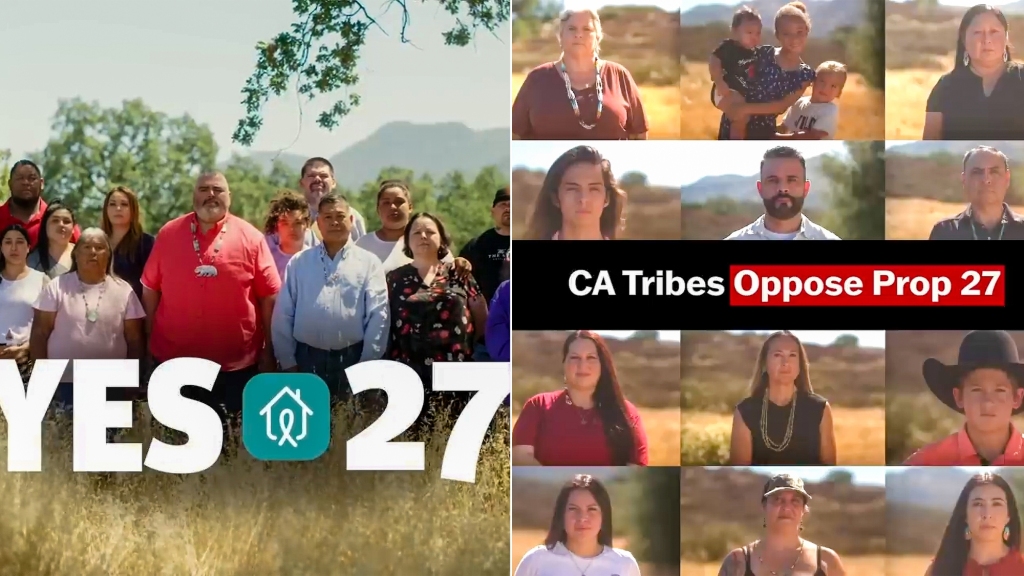
The ballot showdown to legalize sports gambling in California already is the most-expensive set of propositions in state history, with all sides poised to eclipse $400 million in campaign contributions, setting off a dizzying barrage of campaign ads that will only pick up between now and Election Day in November.
At stake is control of what could be a billion-dollar industry, so the dueling campaigns of Propositions 26 and 27 are spending millions to churn out ads fine-tuned to convince voters that sports-gaming is good for California and that their side should profit. So what do native tribes and homelessness have to do with sports gambling? It’s not always clear from their ads.
A coalition of California tribes support Prop 26, which would legalize sports betting but only in-person at existing tribal casinos and racetracks.
Prop 27 is backed by the large online sports-betting companies, such as DraftKings, and would create an even larger new market by allowing online sports betting in the state. The measure would require a partnership with a California tribe to open an online sports book and specifies how the tax revenue can be spent.
Ads from both campaigns are running so fast and furious that voters are seeing opposing talking points airing back-to-back during everything from YouTube videos to the local news. So for those trying to decide how to vote on Propositions 26 and 27, what should you know to decipher all the slick advertisements?
Which proposition do California tribes support?
All of the ads opposing Proposition 27 emphasize one thing: “California tribes” do not support the proposition that would legalize online sports betting. But if you have been seeing the prolific advertising in support of Prop 27, you might be confused.
The central face for the “Yes on 27” campaign is Jose “Moke” Simon III, tribal chairman of the Middletown Rancheria of Pomo Indians of California, and in one ad he says “only one proposition supports California tribes like ours … vote ‘Yes’ on 27.”
Simply put, his tribe and two others are breaking from the vast majority of California tribes, gaming and non-gaming alike, by supporting Prop 27. But why?
Simon, also a Lake County Supervisor, did not respond to repeated requests for comment.
“Out of self-interest I can see why, particularly remote tribes, would want to be in favor of 27,” said I. Nelson Rose, a law professor and expert on gambling law.
There are around 110 federally recognized tribes in the state, and just over half have casinos, leaving more than 40 tribes without one. And many gaming tribes are located in remote places with little opportunity for in-person gambling revenue.
“Because it is an online platform, we’ll finally be able to realize the promises of tribal gaming in California,” said Nathan Click, spokesperson for the “Yes on 27” campaign. He said many California tribes, the ones who don’t already have large casinos, “see the promise of being able to offer bets on a safe and responsible marketplace outside of their tribal lands.”
Of course, not all California tribes agree on this proposition, let alone other issues, but there is no question where most tribes fall on Prop 27.
“Fifty-nine tribes in California that have taken a firm position (against) prop 27,” said Kathy Fairbanks, spokesperson for the campaign opposing Prop 27 and supporting Prop 26. “There are only three tribes that support it,” she said, saying the ‘Yes on 27’ campaign is “misleading voters” with ads about tribal support.
To drive that point home, the most recently released ads from her “No on 27” committee dedicate one side of the screen to a scrolling list of the tribes that oppose the proposition, contrasted on the other side with a short, static list of the three tribes that support the proposition.
Will passing this proposition solve homelessness?
Outside of tribal sovereignty and support, homelessness is one of the most salient talking points from the gambling proposition ads. But what does homelessness have to do with gambling?
The connection in this case is money, but also strategic messaging.
While establishing a new billion-dollar industry will certainly generate new tax revenue, both propositions are complex, and the amount of projected revenue is uncertain. Both propositions include specific loopholes that benefit the sponsors and details that could present legal hurdles.
The state revenue increase for Prop. 27 is predicted to be in the hundreds of millions, higher than the tens of millions predicted for Prop. 26, according to the state’s Legislative Analyst’s Office. And the Prop. 27 language mandates that 85% of that tax revenue should go to programs to address homelessness, and 15% will go to California’s non-gaming tribes. Whereas any increased revenue from Prop 26 would go mostly to the general fund, with some allocations for mental health and gambling enforcement.
“Homelessness is a crisis across the state,” said Click, who said the “Yes on 27” campaign “worked closely” with local officials and advocates “to make sure this funding goes to where there is the most need.” Several mayors, including Oakland Mayor Libby Schaaf, and non-profit leaders such as Jamie Almanza, the CEO of Bay Area Community Services, are listed as supporters.
To opponents of the proposition, the messaging from the “Yes on 27” camp around solving homelessness is just marketing. “This idea that this is a solution to homelessness is a crock,” said Fairbanks. “They’re trying to dress up an online sports betting gambling measure, and trying to focus on the issue of the day in California.”